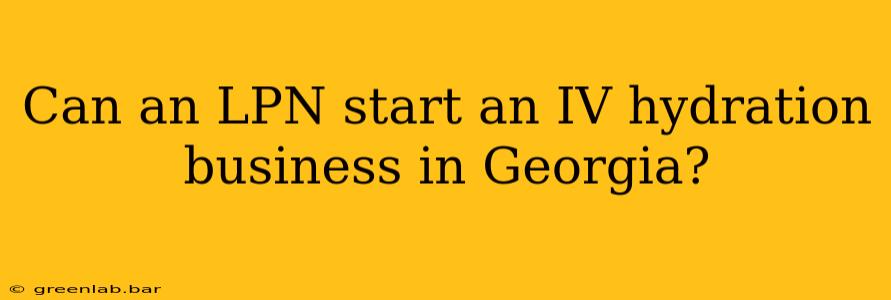The short answer is: likely not without significant limitations and additional qualifications. While an LPN (Licensed Practical Nurse) in Georgia possesses valuable medical knowledge, starting an IV hydration business independently faces significant legal and regulatory hurdles. This article delves into the complexities of this question, exploring the relevant Georgia laws and regulations that govern such ventures.
Georgia's Regulatory Landscape for IV Therapy
Georgia's healthcare regulatory environment is stringent, aiming to protect patient safety. Offering IV hydration services falls under the umbrella of medical practice, requiring adherence to specific licensing and scope-of-practice guidelines. Simply having an LPN license doesn't automatically grant the authority to establish and operate an IV hydration business.
Key Regulatory Bodies:
- Georgia Board of Nursing: This board oversees the licensing and practice of LPNs and RNs. Their regulations strictly define the scope of practice for each license level. Starting an IV hydration business would likely require exceeding the standard scope of practice for an LPN.
- Georgia Composite Medical Board: This board regulates the practice of medicine in Georgia. They would have jurisdiction over any business offering medical procedures, including IV hydration, regardless of who administers them. They would likely require oversight from a licensed physician.
Scope of Practice Limitations for LPNs in Georgia
LPNs in Georgia have a defined scope of practice, generally focusing on assisting RNs and physicians under direct supervision. While LPNs can perform certain tasks under the direction of a physician, independently starting and operating an IV hydration business likely goes beyond this permitted scope. Administering IV fluids without direct physician oversight would be a major breach of these regulations.
Potential Pathways (With Significant Caveats):
-
Collaboration with a Physician: The most realistic path for an LPN to be involved in an IV hydration business would be through close collaboration with a licensed physician. The physician would need to oversee all aspects of the business, including patient assessments, IV fluid prescriptions, and overall medical direction. The LPN would then act under the physician's direct supervision, providing nursing care within their defined scope. This would require a detailed operational agreement and likely necessitate the physician being a significant partner in the business.
-
Working for an Established Medical Clinic: Seeking employment within a medical clinic or facility already licensed to provide IV hydration services would allow an LPN to utilize their skills in a compliant manner.
Legal Risks of Non-Compliance
Operating an IV hydration business without proper licensing and physician oversight poses considerable legal risks. These include:
- Suspension or revocation of LPN license: Violating the scope of practice could result in disciplinary action from the Georgia Board of Nursing.
- Civil lawsuits: Patients experiencing adverse reactions or complications could file lawsuits for malpractice or negligence.
- Criminal charges: In severe cases, operating an unlicensed medical practice could lead to criminal prosecution.
Conclusion: Proceed with Caution
While an LPN possesses the foundational nursing knowledge necessary for IV administration, independently establishing an IV hydration business in Georgia presents significant legal and regulatory obstacles. Careful consideration of Georgia's healthcare laws and close consultation with legal and medical professionals are crucial before pursuing this venture. The safest and most compliant route involves collaborating with a licensed physician who carries ultimate responsibility for all medical decisions and oversight. Without this structure, the risks of non-compliance are too substantial.

